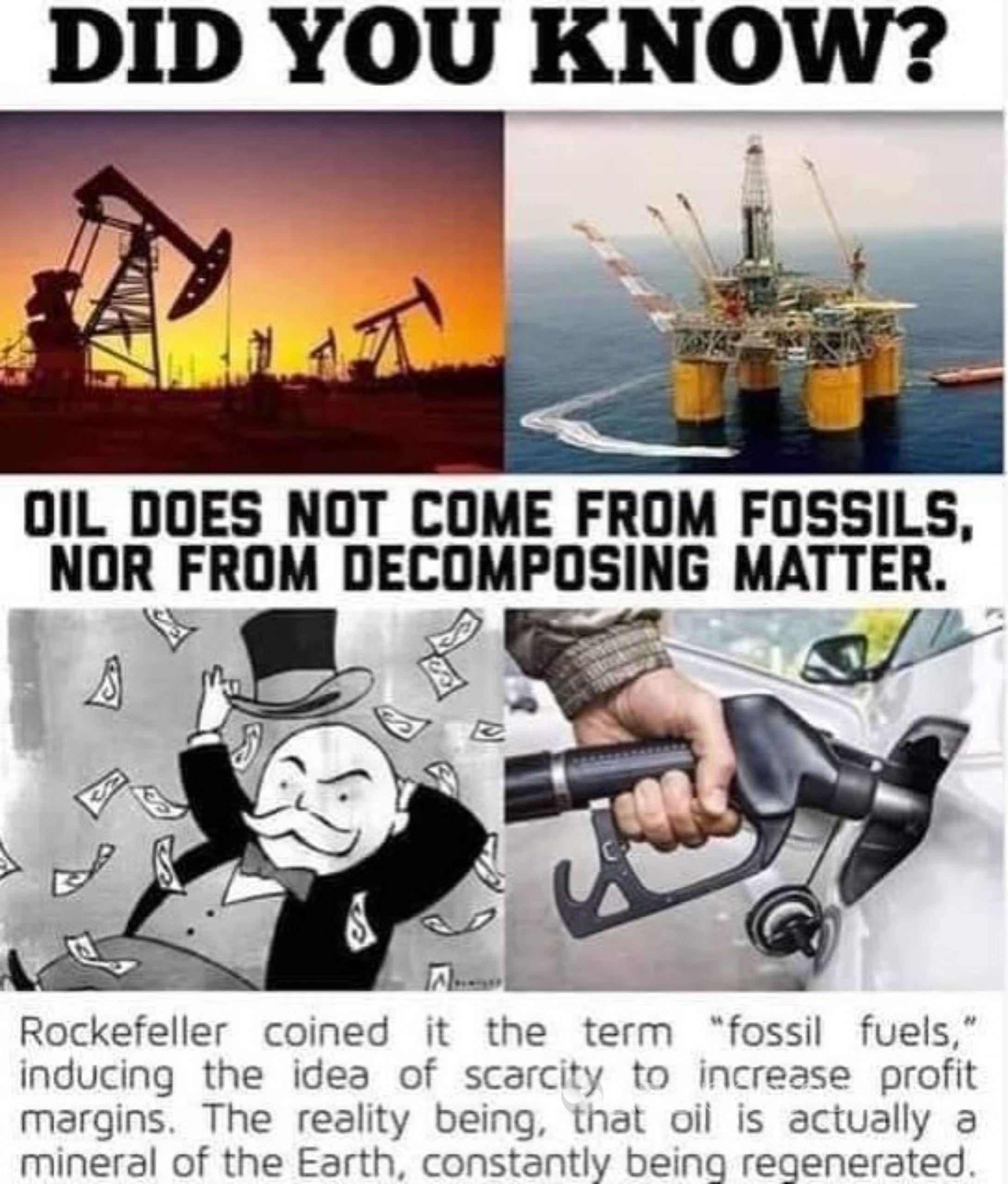The Statement
A Facebook meme posted by an Australian user makes several claims relating to oil – including about the origin of the term “fossil fuels”.
“Did you know? Oil does not come from fossils, nor from decomposing matter,” the post states between pictures of oil derricks, an offshore oil platform, a car being filled from a petrol bowser and the Mr Monopoly character from the popular board game.
“Rockefeller coined it (sic) the term ‘fossil fuels,’ inducing the idea of scarcity to increase profit margins,” it goes on to say. “The reality being, that oil is actually a mineral of the earth, constantly being regenerated.”
At the time of publication, the February 10 post had been viewed more than 18,000 times and shared more than 200 times.

The Analysis
Contrary to the meme’s claims, the phrase “fossil fuels” has been around since at least the 1700s – well before oil tycoon John D. Rockefeller’s time. And while there exist alternate theories about the formation of oil, the scientific consensus is that it is formulated from decomposed organic matter.
Several different versions of the same meme have been shared widely on Facebook, including here, here, here and here.
John D. Rockefeller (1839-1937) founded Standard Oil, which became one of the world’s largest corporations until it was broken up by the US government.
However, the term “fossil fuels” has been in use since before his lifetime, dating back to at least the 1700s. One of its first appearances is in the English translation of German chemist Caspar Neumann’s 1759 book, The Chemical Works of Caspar Neumann and can be seen here in the book’s index.
Neumann (1683-1737) was considered to be influential in the development of chemistry by distinguishing clearly between pure and applied chemistry. He was also named a Fellow of the Royal Society scientific academy in London.
The term featured in numerous other works published before Rockefeller’s birth, including in the title of an 1835 book on the history of fossil fuels and the coal trade in Great Britain.
Fossil fuels are defined by the US Energy Information Administration as an energy source such as petroleum, coal or natural gas formed in the earth’s crust from decayed organic material.
Britannica defines them as “any of a class of hydrocarbon-containing materials of biological origin occurring within earth’s crust that can be used as a source of energy”.
Experts contacted by AAP FactCheck rejected the post’s claim that oil does not come “from decomposing matter”.
Andrew R. Gorman, head of the geology department at the University of Otago in Dunedin, said the Facebook post was not accurate.
“The meme certainly is misleading, but more stretching the truth than outright lying,” Dr Gorman told AAP FactCheck in an email.
“We usually think of a fossil as a ‘trace of organic life preserved in rock‘; so with that definition, there is little or no organic material in fossils.
“Therefore you can say with hand on heart that oil does not come from fossils. This is of course misleading. The ancient organic particles that break down into oil could not be preserved as fossils because they have turned into oil!
“Most oil and gas produced on the planet comes from well-established processes whereby complex molecules of organic material are broken down into much simpler hydrocarbon molecules.”
Simon Lang, professor of petroleum geoscience and director of the Centre for Energy Geoscience at the University of Western Australia, also took issue with the meme’s claims.
“This is nonsense,” he told AAP FactCheck via email.
“Most oil and gas fields are the result of breakdown of organic ‘kerogens’ or particles made of organic molecules into a great arc of differentiated-molecular-weight hydrocarbon chain molecules. All of this is well understood for over 70-80 years and more.”
Prof Lang said isotope analysis on these hydrocarbons meant scientists could even tell the organic molecules they had been formed from, such as lipids from ancient fish.
Some researchers have argued for an “abiotic” theory of oil, which asserts that oil and gas come from non-biological chemical processes taking place at high temperatures deep in the earth. However, the theory is considered controversial and is generally rejected by experts.
“Abiotic methods of petroleum production are possible as the by-product of chemical processes deep in the earth’s crust,” Dr Gorman said.
However, he added that “the volumes of hydrocarbon produced this way have not yet been found to be economically significant”.
The meme’s claim that oil is constantly being regenerated is technically true – but on a time scale far longer than any human will live to see.
“Oil can indeed be considered a mineral,” Dr Gorman said. “And it is constantly being regenerated. You just have to wait a few million years for that to happen – so again this is a misleading statement.”
Similar claims have been previously debunked here, here and here.
The Verdict
The post incorrectly claims the term “fossil fuel” was coined by oil tycoon John D. Rockfeller. It has been in use since at least the 1700s and has featured numerous times in works published before the oil tycoon’s lifetime.
While the post is correct that oil does not primarily come from fossils, experts say it is produced from decomposing organic matter – in contradiction to another of the meme’s claims.
This organic matter breaks down deep in the earth and produces oil, which is regenerated over a process that takes millions of years.
Partly False – Content that has some factual inaccuracies.
* AAP FactCheck is an accredited member of the International Fact-Checking Network. If you would like to support our independent, fact-based journalism, you can make a contribution to AAP here.
All information, text and images included on the AAP Websites is for personal use only and may not be re-written, copied, re-sold or re-distributed, framed, linked, shared onto social media or otherwise used whether for compensation of any kind or not, unless you have the prior written permission of AAP. For more information, please refer to our standard terms and conditions.


















